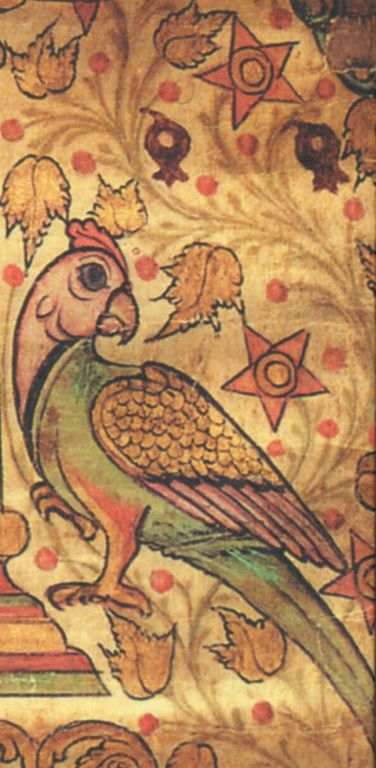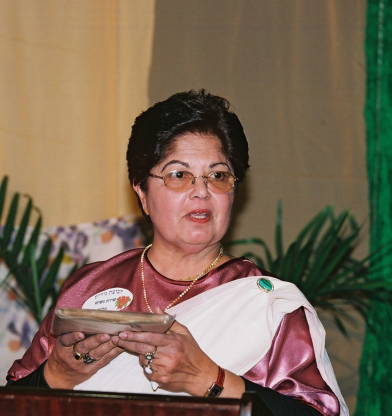1981
69. So It Is Proclaimed and Declared!
Rivka Yehoshua. Recorded by Marcia Walerstein-Sibony and Barbara Johnson, Moshav Aviezer, September 22, 1981. CD Track 35; I-30.
Akñānaṃ astamiccīḍuṃ kāvyakñānaṃ vaḷṟnīḍuṃ
Vidyayāl lokaměllāṃ, věņma ceṟnnu viḷaṅṅīḍuṃChorus: Měbassěṟ, měbassěṟ věomeṟ
1. Good fortune will rise, rise in the world, in an auspicious time.
Good fortune will come to the one who waits, the one who waits with hope.
Mevasser, mevasser v’omer! It’s proclaimed, proclaimed and declared!
2. All dread diseases will be destroyed, destroyed in that time.
Quarrels and fighting will be no more, no more in that time.
Mevasser, mevasser v’omer! It’s proclaimed, proclaimed and declared!
3. The weapons of war will be remade into farming tools.
The spears of war will be melted down into pruning hooks.
Mevasser, mevasser v’omer! It’s proclaimed, proclaimed and declared!4. All the swords will be broken then, and the gunpowder burned
By metalsmiths, as they transform the weapons into plows.
Mevasser, mevasser v’omer! It’s proclaimed, proclaimed and declared!
5. The deceitful one will hang down his head, lower it in shame.
People of honor will fully inhabit the towns and the land.
Mevasser, mevasser v’omer! It’s proclaimed, proclaimed and declared!
6. Even if people greatly increase, no famine will be seen.
God will provide for the needs of the earth, certainly in that time.
Mevasser, mevasser v’omer! It’s proclaimed, proclaimed and declared!
7. Seasons will come, seasons will go, by God’s wisdom and love.
Abundance of rain, plentiful clouds, and the Middle Sea.
Mevasser, mevasser v’omer! It’s proclaimed, proclaimed and declared!
8. Plants in the forest and valley crops, everything will grow—
All we need, in abundant supply, we surely will receive.
Mevasser, mevasser v’omer! It’s proclaimed, proclaimed and declared!
9. Every six months the season will change, as it happens in springtime.
Sunlight by day will brighten the earth, and the moon by night.
Mevasser, mevasser v’omer! It’s proclaimed, proclaimed, and declared!
10. Loving friendships will fill the world, in that auspicious time.
Courthouses will stand vacant then, when lawsuits decrease.
Mevasser, mevasser v’omer! It’s proclaimed, proclaimed, and declared!
11. And when the righteous ways increase, the prisons will be closed.
These empty buildings will be transformed into places of prayer.
Mevasser, mevasser v’omer! It’s proclaimed, proclaimed, and declared!12. Ignorance will vanish then, and poetic knowledge will grow.
Science and culture will combine, together making the world to shine.
Mevasser, mevasser v’omer! It’s proclaimed, proclaimed and declared!13. Selfishness and tyranny will flee as the truth returns.
Open your eyes and you will see holy people everywhere.
Mevasser, mevasser v’omer! It’s proclaimed, proclaimed and declared!14. Thieves will become pure in heart; these words will come to be.
With lightning force this will come to pass; this is the destiny.
Mevasser, mevasser v’omer! It’s proclaimed, proclaimed and declared!15. At that time deceit will hide, as truth is shining free.
For thousands and thousands of future years, this is reality!
Mevasser, mevasser v’omer! It’s proclaimed, proclaimed and declared!
This twentieth century visionary song is unique in combining utopian Malayalam stanzas, chanted in the style of an Indian bhakti devotional hymn, with an exclamation in Hebrew as the chorus following each stanza. The dramatic recording was made in 1981 in Israel by Rivka Yehoshua from Parur, who remembered it as a composition by Shlomo Tattungal of Parur, though it has also been attributed to Yaakov Ḥai Muttat of Parur. Whoever the composer, Zacharia comments that he was well-educated in classical Malayalam literature, skillfully making use of the poetic pāna style and metrical system, which inspires contemplation (personal communication, 2001).
The Hebrew phrase that serves as a chorus refers to the herald—understood to be the prophet Elijah—who announces the messianic end of days (Isaiah 52:7). It is also the repeating chorus attached to three different Kerala Jewish piyyutim sung during the holiday of Simḥat Torah, each beginning Kol mevasser, mevasser ve’omer (“The voice [of the herald] proclaims and declares.”[1] The Hebrew refrain also echoes the phrase “mevasser shalom” (“proclaiming peace”), repeated throughout a modern Iraqi piyyut that is arguably the most popular Hebrew song also among contemporary Kochinim in Israel: Mah Na’vu ‘Alei (’Areshet 1980, 52).
In contrast to these Hebrew hymns, which are filled with messianic references to the final time of redemption, the Malayalam composition envisions an earthly golden age of plenty and peace without disease, famine, or war, in which God will grant predictable seasons and plentiful crops, and people will lead lives of justice, equality, honesty, and education—a vision highly compatible with the Gandhian and Marxist ideals that were current in Kerala leading up to Indian Independence in 1947.
Stanzas 3 and 4 echo the well-known biblical passage about turning swords into plowshares (Micah 4:3). Venus Lane notes that other stanzas can be compared to two non-Jewish Malayalam songs or poems. One is a 1932 poem portraying a utopian vision of the future: “Herald of the Dawn” by Amshi Narayana Pillai, a Hindu poet and Gandhian freedom fighter (Andalattu1997, 20–22).[2] The other is the popular song “When King Mahabali Ruled the Land sung for the all-Kerala holiday of Onam and recalling the mythical golden age of peace and justice when Kerala was ruled by the legendary King Mahabali.[3]
________________________________
[1] One of these piyyutim (’Areshet 1980, 158–160), attributed to R. Eleazer ben Kallir, is widely sung by Sephardi and Ashkenazi Jews for Hoshanah Rabbah at the end of Sukkot. Along with the other two (’Areshet 1980, 158–60, 218–219), it was sung by Jews in Kerala on the afternoon of Simḥat Torah before and during their special afternoon hakafot around the outside of the synagogue.
[2] See below in Section V for the note to song 75, “It Is Dawning,” which borrows some of the lyrics from this poem.
[3] For a contemporary performance of this traditional song, with English translation, see https://www.youtube.com/watch?v=4XsmZvalkUY. Viewed October 1, 2022.






